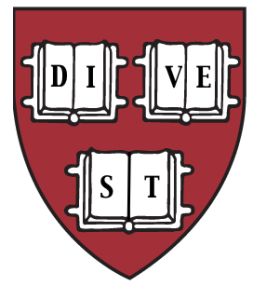Tough love at Harvard
Anyone with a major addiction knows what it’s like to feel imprisoned: you can’t think straight; you can’t face reality; you can’t stop doing what you’re doing, however destructive it is to yourself and others. Because recovery from addiction is such a difficult process, addicts need the tough love of allies and friends in order to make the journey to freedom.
From April 12-17, 2015, members of the Harvard community will come together on campus to speak out for climate justice and to urge the university to divest its holdings in the fossil fuel industry.

Harvard Heat Week is an act of tough love.
For me, it’s personal. All my life I have been affiliated with Harvard. My father, John M. Bullitt, was a Harvard professor, specializing in 18th century English literature. When I was seven years old, he was appointed the first Master of Quincy House, and that’s where I grew up. Years later I returned to Harvard to earn a Ph.D. (‘84) in comparative literature.
Harvard was the place where I learned first-hand about addiction. As a graduate student, I confronted my father’s life-long alcoholism and helped to organize an intervention into his drinking. A few months later, I confessed my own addiction, which is to food. On April 13, 1982, I admitted that I was powerless and needed help. On that decisive day I began a journey to freedom, assisted by a community of friends who helped me stay the course. Recovery from addiction changed everything. Now abstinent, I finished my doctorate, left Harvard, and headed to divinity school to learn about the God who had just saved my life. I was ordained in the Episcopal Church and have served as a priest ever since.
On April 13, 2015 – thirty-three years to the day since I began my recovery from addiction – I will head back to Harvard to urge my alma mater to divest from fossil fuels.
Call it an intervention. Call it an act of hope. Call it a plea from one addict to another: liberation is possible. Together we can set a course to a more just and sustainable future. Together we can turn from death to life.
The juggernaut of our economic system is devouring the earth, relentlessly seeking to extract every drop of oil, every ounce of coal, and every trace of so-called “natural” gas. An addictive system is insatiable. It knows no limits. It rejects any regulation and restraint as it strains forward to grab the next dollar and franc and rupee and yen.
Like every addict, an addictive system can’t think clearly. It hides behind excuses and denial, distraction and delay. It prefers to talk about the problem rather than to take meaningful action. It insists, sometimes in all sincerity, that no other way of life is possible. It’s too late to change. We can’t stop – not yet, anyway. Not now. First let’s drill more oil wells, build more pipelines, suck out more tar sands, and blow off more mountaintops. Let’s find out how much more petroleum we can burn, how much more carbon pollution we can pour into the atmosphere, and how much more money we can make before we propel the world into climate chaos.
Divesting from fossil fuels is an act of recovery and liberation. It is a way of saying no: no to the fantasy that corporations can gobble up the earth with impunity, and the devil take the hindmost; no to the lie that where we invest our money doesn’t matter, as long we make more; no to the illusion that you can argue with an addict – by, say, engaging in shareholder activism – and provoke any fundamental change in the addict’s behavior. 
Divesting from fossil fuels is a way to say no to a death-dealing, addictive system. Investing instead in clean renewables, such as wind, water, and sun, is a way of saying yes: yes to aligning our money with our mission and values; yes to safeguarding life as it has evolved on this planet; yes to making the rapid personal and societal changes we need to make if we’re going to prevent the web of life from unraveling.
As many addicts know, sometimes only a power greater than ourselves can restore us to sanity. In the end, the most abundant and most powerful source of energy is the power of love. I put my trust in that power, in the divine Spirit that longs to “renew the face of the earth” (Psalm 104:31).
During Harvard Heat Week I will return to campus and risk arrest in an act of peaceful civil disobedience. I will do this for all kinds of reasons: because I love my son, because I love my grandchildren, because I love the holy Mystery that creates and sustains life. Above all, I will do it because, speaking as one addict to another, I understand how hard it is to change. Sometimes only love can stop a person, group, or society from self-destruction – the kind of tough love that stands fast, holds the addict accountable, and refuses to settle for a catastrophic status quo.

9 Responses to “Tough love at Harvard”
Lana Eisenberg
This is very moving — and helpful. Thank you.
mbj
Thanks for your comment, Lana. I appreciate it.
Peter Converse
Thank you Margaret. I relate very well, having followed path similar to yours, though to lay ministry after EDS rather take ordained. I’ve spent nearly my entire ministry working with addicts and their families, and have often wondered how to address institutional addiction — and lately the addiction that seemed to have swept this country — addiction to money, power, fear. It’s as if the whole society needs an intervention. And you’re right. It’s a matter of tough love now. We’ve tried everything else. Maybe Harvard Yard is a place to start.
I keep flashing back to EDS and my 2 daughters about 8 and 10 years old when I was there, and reading to them Madeline L’Engle’s wonderful time trilogy, especially “A Wrinkle in Time” and the tears and fears that gripped us as she described the shadow of evil that seemed to envelope this beautiful blue marble floating in space — and how the love that poured through Meg and company that dispersed the darkness. It’s that kind of love we need now, pouring through all of us as channel of God’s redeeming grace.
mbj
Thank you for these beautiful words, Peter. I need to re-read A Wrinkle in Time — thanks for the suggestion. And thank you for your ongoing witness to how Love can change a person’s life!
Chris Young
With the ice sheets of Greenland and of West Antarctica in unstoppable and irrevrersible flow into the ocean, its no exaggeration to say that the fossil fuel industries are pushing the system to see how fast it can destroy the habitat. It is completely accurate to describe this behavior as based on blind, unthinking addiction. And who are the “pushers”? The most irresponsible industry in history, the fossil fuel companies.
mbj
Thanks so much for your support, Chris. I find the addiction analogy very helpful. Our work as climate activists has an outer and an inner aspect — outer, because we need to confront the equivalent of drug pushers — but also inner, because we, too, are liable to addictive patterns of thought and behavior. That awareness keeps me humble. I guess we need to be both humble and bold. Onward!
Rev. Fred Small
The most powerful witness comes straight from the heart and tells one’s own story with humility and vulnerability. Beautifully done, Margaret. Thank you.
mbj
Fred, I am so grateful for your friendship as we participate in this movement. Thank you for your kind words, and for your leadership.
George "Kim" Chaffee, '64
Beautifully expressed, Margaret. I also just read your blog on Pope Francis, which was equally beautiful. I too grew up in a family with an alcoholic father. I didn’t realize how this affected me until I got married at the age of 37 and attended an Alanon meeting, at the behest of my wife. Confronting my demons led to huge spiritual and emotional growth. Like you, I was at Heat Week and sat in at the HAA offices. I have been emailing my classmates to get them to sign the letter of support for DH. Toby Sackton and Frinde Maher are soliciting other class coordinators.